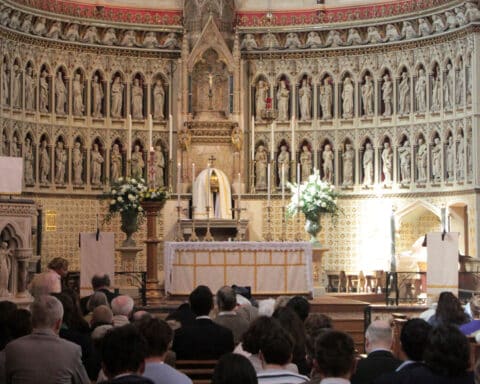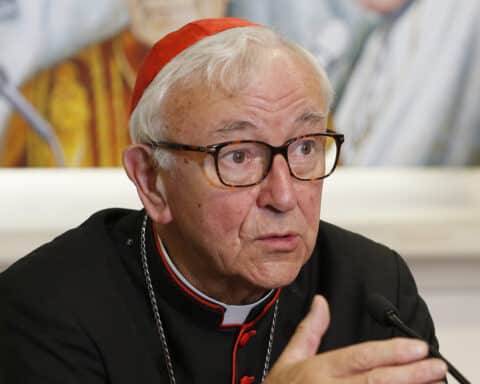When Our Sunday Visitor editor, Father Patrick Briscoe, OP, and I conceived of this periodic column, we decided to call it “Grace is Everywhere” (the name of the column in the printed newspaper). The purpose of the column is to suggest, analyze and comment upon various ways in which God’s grace is communicated through truth, beauty and goodness, commonly known as the three transcendentals. I have used the column to write about film, TV, literature, popular music and sports among other topics.
I have discussed the presence of grace in things that are not Catholic or even more broadly Christian. This is because whatever is true, beautiful and good is a participation in the mind of God and, therefore, grace-bearing. If it is from God, it is true, beautiful and good; if it is true, beautiful and good, it is from God. Nothing that comes from God is otherwise; and there is no source of truth, beauty and goodness other than God.
This is not to diminish the salvific grace that is communicated in the seven sacraments, of course. Our celebration of grace everywhere should never be considered a substitute for the grace found in the specific sacramental practices of the Church. But the graces to be found in common expressions of the transcendentals may be both precursors to and tutors in the growth toward the fullness of faith.
These things have been distilled in my mind on my recent trip to Oxford for the marriage of my daughter, Beatrice, and her new husband, Jon. (I write these words on a glorious Sunday morning outside a café just a few steps in either direction from both Blackfriars and the Oxford Oratory, the location of the wedding.) Over four days of feasting and celebration, I have been confirmed in my conviction that grace is everywhere. And I have discovered that the profligacy of God’s extravagant grace comes in many forms.
Grace in hospitality
Because my daughter lives in England and met her English husband there, we had never met any of his family, nor even been introduced to them. This was, I think, designed, as we wanted our first meeting to be free of social media “friendships,” and thus more spontaneous than electronic introductions allow. We did not know what to expect, of course. And I certainly did not expect the overwhelming grace that flowed from the generous hospitality of Jon’s family. As we gathered for the rehearsal dinner, our hearts were more full than our stomachs as the families discovered a depth of community and fellowship that none of us expected.
I am convinced that this grace was mediated — quite unconsciously — by the love of Beatrice and Jon, the depth of whose affection for one another overflows the banks of their relationship. After a friend noted to me how joyous the occasion was, I remarked that sometimes grace can be accidental. By this I mean that the presence of goodness and beauty is sometimes communicated without any conscious purpose. Grace flows from the magnanimity of those who have been schooled in hospitality, among the highest virtues in the Christian tradition. The family of my new son-in-law confirmed that for me in the most unassuming way.
Grace in the Sacrament of Marriage
Of course, the wedding itself was the celebration of one of the Church’s sacraments. But the grace that sealed Jon and Bea’s affection for one another permeated the Oxford Oratory. God’s grace overwhelmed Christian and non-Christian alike, as we bore witness to their love for one another.
Moreover, grace was found in the care and detail of the priest’s catechetically rich homily. Among other things, Father Nicholas told Bea and Jon that the notion of marriage as a 50/50 partnership is nonsense. Sometimes it’s 70/30, he noted; sometimes it’s 100/0. Why else, Father asked rhetorically, would the vows include a promise to have and to hold for better or worse? This called to my mind Pope St. John Paul II’s teaching that marriage is based in “disinterested reciprocity.” As Jon and Bea pledged themselves to one another, grace was everywhere in that Church, penetrating our hearts, minds and souls.
Grace in the cries of children
When we went back to the Oratory for Mass Sunday morning, the church was filled to capacity. (As I quipped to my wife, there aren’t many Catholics in England, but they’re the only ones who go to church.) More importantly, I am convinced that the average age of worshipers was younger than any Mass I’ve ever attended. Young parents and their many infants and toddlers filled the Church with the sound of tussling, fussing, chattering and crying. And, of course, all of that “distraction” was a source of grace.
There’s no end to complaints about unruly children at Mass on social media. This is misplaced. Of course, if a child is throwing a tantrum or otherwise causing an unusual distraction, he or she might need to be taken to the back. But the normal fussing, fidgeting, whimpering, whispering of babies and toddlers is the sound of grace — grace that fills the heart with joy and hope.
The column is called “Grace is Everywhere.” After four grace-filled days in Oxford, I’m more convinced than ever of the truth of the title.





